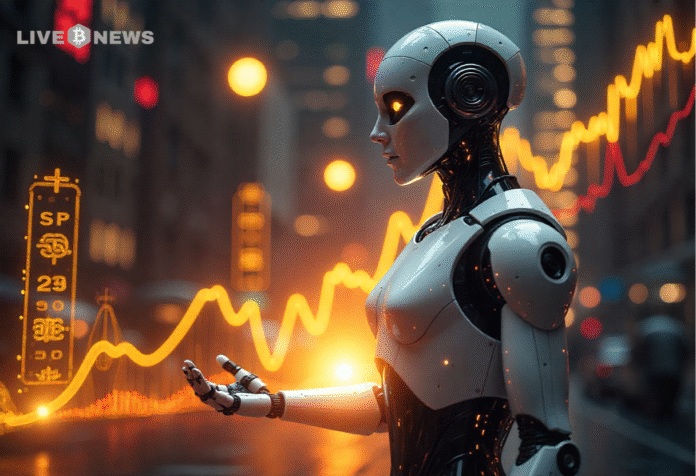Analyst Jordi Visser has just warned that AI will make stocks obsolete by speeding up innovation cycles. This is expected to push investors toward Bitcoin as a lasting store of value.
Artificial intelligence is improving how investors view the future of capital markets. Analyst and investor Jordi Visser argues that AI will make stocks obsolete by accelerating innovation.
He says that this will happen so rapidly that public companies will no longer be able to deliver lasting value. Instead, he predicts that Bitcoin will stand out as a stronger long-term investment.
Bitcoin as a Belief Asset
Visser mentioned these in a conversation with Anthony Pompliano, and noted that if innovation cycles shrink to weeks rather than decades, companies will struggle to achieve stability.
Investors, he said, will look for assets that endure. He believes that Bitcoin fits this role because it functions as a “belief system,” rather than a short-term idea.
Visser described Bitcoin as a “belief” that can last far longer than corporate lifespans. He compared it to gold, which has served as a store of value for thousands of years.
Public companies, on the other hand, happen to rise and fall quickly, especially when innovation accelerates.
I spoke with @jvisserlabs this week about the Federal Reserve, what is going to happen with artificial intelligence, future outlook for the stock market, and why interest rate cuts will be so bullish for bitcoin.
Enjoy!
YouTube: https://t.co/BN9rdmWs0H
Spotify:… pic.twitter.com/1GEfYPfJ2e— Anthony Pompliano 🌪 (@APompliano) August 30, 2025
“Bitcoin will be around for a long, long time,” Visser said, stressing that it has reached the stage where its survival is not in question.
The asset is also unlike businesses that depend on staying ahead of competitors, in that its value stems from international adoption and shared conviction.
He also noted that AI could compress a century’s worth of progress into just five years. If such an environment comes into play, traditional companies will constantly face disruption.
Assets like Bitcoin, which operate independently of these corporate cycles, may appear more attractive.
Capital Moving From Stocks to Bitcoin
The trend change is already happening. Some public companies are rebranding themselves as Bitcoin-focused treasury firms.
They are abandoning legacy operations to hold crypto directly, and this trend allows equity investors to have indirect exposure to Bitcoin, while also redirecting funds away from traditional capital markets.
Eric Trump also mentioned, at the recent Bitcoin Asia conference in Hong Kong, that Bitcoin could reach $1 million as nation-states, wealthy families and corporations add it to their reserves.
🇺🇸 ERIC TRUMP SAYS #BITCOIN IS GOING TO $170,000 SOON
HE KNOWS WHAT’S COMING‼️ pic.twitter.com/gP2lIhMN9O
— BitcoinConfAsia (@BitcoinConfAsia) July 9, 2025
The asset’s current market cap stands above $2.1 trillion. Some analysts argue that it could eventually beat gold, especially because Bitcoin also earns yield through DeFi.
The Role of AI in Reshaping Finance
Visser’s warning that AI will make stocks obsolete hinges on how fast innovation is now moving. Public companies once relied on decades of steady growth.
However, AI can reduce development cycles to weeks and leave businesses unable to maintain an edge.
This relentless pace may force investors to focus on assets that are less tied to innovation cycles. Bitcoin, as a scarce digital currency, fits that description.
Its rules are fixed, and its supply is capped. Unlike a company that can be disrupted or replaced, Bitcoin operates on a network that works, regardless of individual business performance.
A New Era for Investors
If AI truly makes stocks obsolete, investors may need to reconsider their current strategies. Trading may replace long-term equity positions, while assets like Bitcoin could serve as hedges for preserving wealth.
Institutional adoption is already showing this direction. Spot Bitcoin ETFs, corporate treasuries and sovereign reserves have been growing lately.
These moves are aligned with Visser’s theory that Bitcoin is more than a speculative bet.
It is instead becoming a major pillar of finance.
While no one can predict the future to the letter, the combination of AI and Bitcoin adoption is forcing investors to consider a different way of doing things.
The next few decades may look less like the era of industrial giants and more like one of defi and digital strategy.





